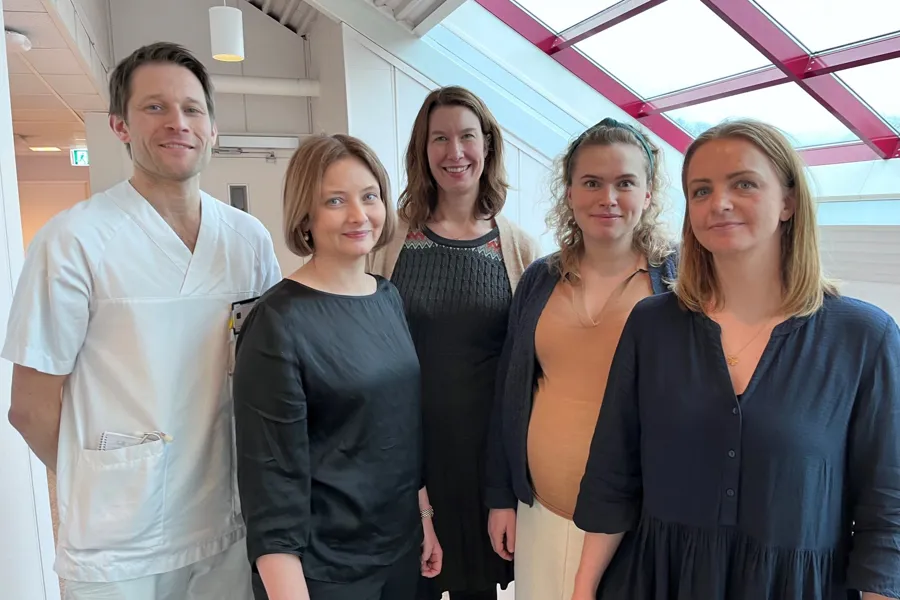Interesting Trials within Clinical Immunology
- The NorTrials centre for clinical immunology at Stavanger University Hospital covers the therapeutic areas of rheumatology, dermatology and endocrinology, says head of NorTrials Immunology, Inger Marie Skoie.

- The fact that we cover three therapy areas means that we are not affiliated with one particular department. We are affiliated with the research department at the hospital, and we think this is a very good solution, says Skoie.
When they started up in 2022, they were given the name NorTrials Centre for Autoimmune Diseases and Inflammation, but have since then changed the name to clarify which disciplines the centre works with.
Working on Structure and Networking
Skoie, who is a specialist in dermatology, is responsible for the dermatology network. Sondre Meling, a specialist in internal medicine and endocrinology, is responsible for the endocrinology network in a 20% position, while Jens Vikse has been hired to lead the rheumatology network. In addition, Marthe Alver Hovsbakken and Karianne Enerstvedt are coordinators for the NorTrials Centre and the Research Department, respectively.
- We are keen to ensure that feasibility requests reach the right people as quickly as possible. We have therefore built up a structure where we have two contact persons at each university hospital. We also have regular meetings with other relevant hospitals. We experience that clinicians really wants to participate in industry-funded clinical trials, says Skoie.
The NorTrials centre has received 9 feasibility requests for 2023, 4 of which are in dermatology and 1 in rheumatology. 3 of them have already started up.
Proud to be Part of Norwegian Psoriasis Trial
One of the two dermatology trials is being conducted by Smerud Medical Research Group on behalf of Arctic Bioscience. Arctic Bioscience is a Norwegian biotechnology company based at Ørstafjorden in Western Norway and in the Oslo Science Park. The company is developing a drug from herring roe - for the treatment of mild and moderate plaque psoriasis. Currently, there are few treatments other than cortisone creams and light therapy for these patients. The drug candidate, currently named HRO350, can reduce the skin symptoms of psoriasis by affecting inflammatory processes.
Public-private Collaboration
The trial is taking place in five European countries: UK, Germany, Poland, Finland and Norway, with 519 patients included. A dozen patients have been recruited in Norway, at Stavanger University Hospital, Ålesund Hospital, Haukeland University Hospital, Nordland Hospital, University Hospital of North Norway and Arendal Hud. In terms of patient numbers, this may be the largest clinical trial ever conducted by a Norwegian biotech company.
- This trial is a good example of good collaboration between universities, university hospitals and industry. Arctic Bioscience ran a pilot in 2019 and now their phase 2 study is well underway. We are also very satisfied with Smerud as a CRO company. They have done a very tidy job and the feasibility process went very smoothly, says Skoie.
Feasibility and CTIS Assistance for the Whole Hospital
The coordinators Marthe and Karianne make a great effort to receive requests for trials and forward the requests to the relevant investigators.
- We have had meetings with the various departments to explain why we are doing this, what we expect and to clarify how they want to be contacted. We are also working on establishing a network of study nurses and coordinators so that we can exchange experiences and frustrations, as they do at NorTrials Cancer, says Enerstvedt.
She also plans to familiarize herself with the EU application portal CTIS so that she can help those who are struggling with it.
Marthe Alver Hovsbakken is keen to convey to the hospitals that they are not committing themselves to anything by answering yes to the first initial feasibility request.
- Many answer 'no' because they think it is both binding and because they believe the trial will start quite immediately. But the trial may not start for another year, and it is not binding until they have entered into an agreement with the sponsor, Hovsbakken reassures.